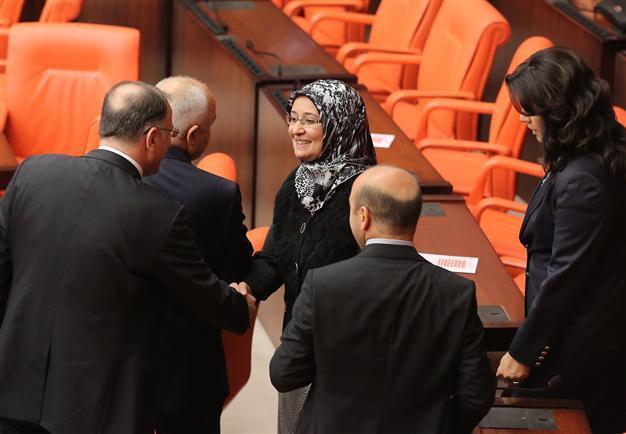Lawmakers wearing headscarves attend session in Turkish Parliament for first time
ANKARA

AKP Deputy Gülay Samancı in Parliament. DAILY NEWS Photo / Selahattin SÖNMEZ
Four female lawmakers of the ruling Justice and Development Party (AKP) entered a General Assembly meeting in Turkey’s Parliament wearing headscarves on Oct. 31, 14 years after a similar move led to high tension.
Sevde Beyazıt Kaçar, Gülay Samancı, Nurcan Dalbudak and Gönül Bekin Şahkulubey became the first women to wear headscarves in a parliamentary session without any major protests from the opposition.
The four deputies entered the General Assembly hall 10 minutes before the session convened and were congratulated by Justice and Development Party (AKP) lawmakers. Many MPs took photos with the four women and posted them on their social media accounts.
Although all who took the floor at the session spoke about their situation, the four lawmakers preferred not to take the floor during the session.
When Deputy Parliament Speaker Meral Akşener opened the session, main opposition Republican People’s Party (CHP) deputy parliamentary group chair Muharrem İnce demanded a debate on the procedure. “We are witnessing a first here since the Parliament opened. All parties should express their opinions on the issue,” İnce said.
İnce took the floor to make the CHP’s position clear. “We will not allow [the AKP] to use the issue as a matter of politics during an election campaign; we will not let them play the role of a mistreated party,” he said.
Stating that the four deputies had rarely taken the floor of Parliament’s General Assembly in the past, İnce criticized them for not bringing up any issues about women’s rights in Parliament previously.
“You [the AKP] have deceived people for years by using this issue. We will not allow you to do so this time,” he said.
İnce also criticized Prime Minister Recep Tayyip Erdoğan for using the rhetoric of “My headscarved sisters.” “He always says ‘My headscarved sisters...’ Aren’t women who don’t cover their heads your sisters? Both veiled and non-veiled women are our sisters,” İnce said, receiving applause both from his party and the AKP ranks, including the four veiled lawmakers.
Peace and Democracy Party (BDP) deputy Pervin Buldan voiced her support for the deputies being allowed to enter Parliament while veiled, and said men should no longer interfere in women’s dress.
The deputy head of the Nationalist Movement Party (MHP), Ruhsar Demirel, gave a speech that won many plaudits. She said they were experiencing a “usual” day in Parliament, adding that the four lawmakers were facing mobbing and that her party refused to judge people based on their outfits in the name of all women. Echoing Buldan, Demirel called on male politicians to cease making politics over women.
Demirel also criticized AKP lawmakers who shared their photos taken with the headscarved deputies via their Twitter accounts. “You cannot treat these women like they are fish in an aquarium. Please respect their privacy,” she said.
AKP Istanbul deputy Belma Satır expressed her pleasure about the speeches that went before her, saying everyone had been waiting for this positive environment.
“We are ending one of the prohibitions in Turkey. Making politics over women is a subject that we are all against. We should have done what was necessary according to the Constitution regarding a democratic and secular Turkey. Our headscarved friends will continue to work with us as a part of this democratization move,” Satır said.
CHP deputy Şafak Pavey also took the floor and gave a much anticipated speech, speaking about “unjust treatments at Parliament.”
Pavey, who has a prosthetic leg, is not permitted to wear trousers in Parliament due to internal regulations. She noted that she could not find any remarks about other people’s freedoms when she searched through the headscarved deputies’ previous speeches.
“But I heard this defamation in news reports: ‘I will not get dirty anymore by unveiling my head.’ Are those who are not veiled dirty? Who could dare to label someone as dirty due to their beliefs?” she said.
Pavey recalled that internal regulations were not changed to allow her to wear trousers, although it could have been done with a one-article legal amendment. “How come the most authoritarian government in Turkish history did not change the internal regulation, which would have taken a couple of minutes? Maybe they aimed to score political gains imagining that their planned show would turn into a fight. I don’t know exactly, but I will never wear trousers unless the internal regulations are amended,” she said.
Parliament Speaker Cemil Çiçek, meanwhile, said there was no obstacle in Parliament’s bylaws preventing Pavey from wearing trousers.
Deputy Prime Minister Bülent Arınç, also speaking at the debates at the General Assembly, said the scene had shown the maturity of Turkish democracy, especially when compared to the Merve Kavakçı incident of 1999.
Kavakçı was elected as an Istanbul deputy for the Virtue Party (FP), the ancestor of the AKP, in 1999. However, she was prevented from taking the parliamentary oath for wearing a headscarf, and her citizenship was subsequently annulled on the grounds that she was a citizen of the United States.
